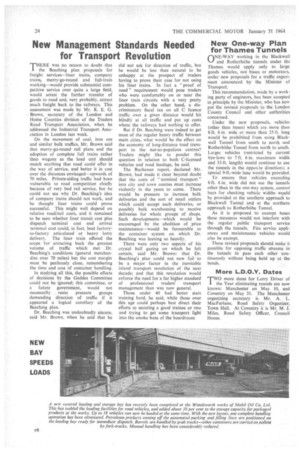'THERE was no reason to doubt that 1the Beeching plan
Page 26

If you've noticed an error in this article please click here to report it so we can fix it.
proposals for freight services—liner trains, company trains, merry-go-round and full-train working—would provide substantial cornpetitive service over quite a large field. would arrest the further transfer of goods to road and, very probably, attract much freight back to the railways. This assessment was made by Mr. R. E. G.
Brown, secretary of the London and Home Counties division of the Traders Road Transport Association, when he addressed the Industrial Transport Association in London last week.
On the movement of coal, iron ore and similar bulk traffics, Mr. Brown said that merry-go-round rail plans and the adoption of complete full trains rather than wagons as the load unit should match anything that road could offer in the way of service, and better it ill cost over the distances envisaged—upwards of 70 miles. Private-siding traffic had been vulnerable to road competition chiefly because of very bad rail service, but he could not see why Dr. Beeching's idea of company trains should not work, and he thought liner trains could prove successful. This might well depend on relative road/rail costs, and it remained to be seen whether liner transit cost plus dispatch terminal cost and arrival terminal cost could, in fact, beat factoryto-factory articulated or heavy lorry delivery. The liner train offered the scope for attracting back the greatest volume of traffic which met Dr. Beeching's conditions (general merchandise over 70 miles) but the cost margin must be perilously close, remembering the time and cost of container handling.
In studying all this, the possible effects of decisions by the Geddes Committee could not be ignored; this committee, or a future government, would not necessarily resist pressure groups demanding direction of traffic if it appeared a logical corollary of the Beeching plan.
Dr. Beeching was undoubtedly sincere, said Mr. Brown, when he said that he did not ask for direction of traffic, but he would be less than natural to be unhappy at the prospect of traders having to prove their case for not using his liner trains. In fact a " proof of need" requirement would pose traders who were comfortably on or near the liner train circuits with a very pretty problem. On the other hand, a discriminatory fiscal tax on all C licence traffic over a given distance would hit blindly at all traffic and put up costs where the railways had nothing to offer.
But if Dr. Beeching were indeed to get most of the regular heavy traffic between main cities, what would be the effect on the economy of long-distance road transport to the not-so-populous centres? Traders might like to ponder this question in relation to both C-licensed vehicles and road haulage, he said.
The Buchanan report, declared Mr. Brown, had made it clear beyond doubt that the costs of "terminal transport" into city and town centres must increase violently in the years to come. There would be pressure to increase bulk deliveries and the sort of retail outlets which could accept such deliveries, or possibly bulk warehousing to receive deliveries for whole groups of shops. Such developments—which would be encouraged by the abolition of price maintenance—would be favourable to the container system on which Dr. Beeching was leaning so heavily.
There were only two aspects of his crystal ball gazing on which he felt certain, said Mr. Brown; that Dr. Beeching's plan could not now fail to be a major factor in the inevitable inland transport revolution of the next decade; and that this revolution would enforce the need for a far higher standard of professional traders' transport management than was now general.
Those under 40 had better start training hard, he said, while those over this age could perhaps best direct their efforts to securing a good trainee or two and trying to get some transport light into the smoke haze of the boardroom




















































































































